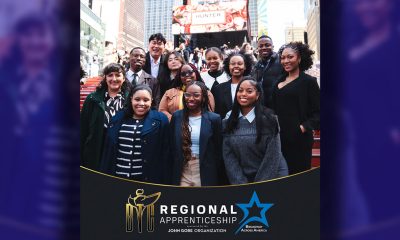Community
Durkan, Best Announce Plan To Relaunch Seattle’s Community Service Officer Program
THE SEATTLE MEDIUM — After extensive input from community, Seattle Mayor Jenny Durkan and Seattle Police Chief Carmen Best announced the City of Seattle will relaunch its Community Service Officer Program and the Seattle Police Department will hire 12 new Community Services Officers (CSOs), including two supervisors, to help residents and businesses involved in non-criminal calls navigate services, engage with communities and neighborhoods, and support programming for at-risk youth.
By The Seattle Medium
After extensive input from community, Seattle Mayor Jenny Durkan and Seattle Police Chief Carmen Best announced the City of Seattle will relaunch its Community Service Officer Program and the Seattle Police Department will hire 12 new Community Services Officers (CSOs), including two supervisors, to help residents and businesses involved in non-criminal calls navigate services, engage with communities and neighborhoods, and support programming for at-risk youth.
The CSO program previously operated for 33 years, until 2004, when it was discontinued due to budget limitations. In the 2017-18 Biennial Budget, the Seattle City Council set aside funding for Community Service Officer (CSO) program development in 2017 and initial implementation in the second quarter of 2018. Mayor Durkan’s 2018 budget provided the resources needed to implement a new CSO Program under the vision of Chief Best.
“We must continue to build trust between communities and the Seattle Police Department, and we must constantly renew our City’s commitment to true community-based policing,” said Durkan. “Relaunching our Community Service Officers Program reflects our promise to make Seattle a safer, more inclusive place for all. With these new Community Service Officers and under Chief Best’s leadership, we can do more to connect residents with the services they need, engage with communities and neighborhoods, and support at-risk youth. I thank the City Council for being stalwart supporters of that program and helping make sure we had these resources.”
“The Community Service Officer program has a rich history within our department and our community,” said Best. “I am pleased that this program is being restored and will once again support our police officers in their work to promote public safety in our neighborhoods.”
“I am excited for the Seattle Police Department to roll out this critical public safety program that will provide a helpful resource to both the community and our police officers,” said Seattle City Councilmember M. Lorena González. “The Seattle City Council has championed the revival of the CSO Unit since 2016, and I believe the program’s renewal will allow Seattleites to receive additional public safety services by these community-based service officers, while sworn officers gain additional capacity to focus on crime prevention and investigations.”
SPD’s Community Service Officer Unit will be staffed by non-commissioned officers who are trained and work as liaison personnel between the community and the SPD, and support SPD’s community-oriented policing strategies. CSOs respond to and address public safety concerns that do not immediately require a police officer or other agency response. CSOs do not carry weapons or enforce criminal laws but will work to bridge the gap between non-criminal service calls and a variety of public safety-related community service and outreach work throughout Seattle’s communities.
To help determine the focus and meet the needs of the communities serviced, SPD in partnership with the Office for Civil Rights (OCR), engaged community-based organizations in the process, hosting more than 30 meetings throughout the city. SPD will conduct additional community engagement over the coming months with stakeholders to obtain additional feedback before the City begins the hiring process for the CSO roles.
Community Service Officers will engage residents and businesses across the City and SPD is working with the Department of Neighborhoods (DON) to develop a comprehensive outreach strategy to recruit a diverse applicant pool that is representative of Seattle’s diverse communities. The SPD seeks to fill the open CSO positions with individuals from demographic groups currently underrepresented in the Police department, including elders, immigrants, and individuals with past involvement in the criminal justice system.
The City’s new CSOs have three key responsibilities:
Help Residents Navigate Services: The officers will respond to non-criminal calls that do not require the enforcement authority of a sworn police officer. They will evaluate the needs of residents, including people experiencing homelessness, at-risk youth, individuals struggling with substance use disorder, and the elderly. They will also connect people with available City services and programs like diversion opportunities, youth programming, emergency services (e.g., housing, food or other), elder services, and behavioral health services. They will also help mediate conflict, such as family, landlord/tenant and neighbor disputes, investigates the cause and identifies solutions or refers parties to appropriate services (e.g., counseling or legal assistance).
Engaging with Communities and Neighborhoods: CSOs will help develop and execute outreach plans and maintain relationships with community partners and cultivates new partnerships. They will prepare outreach materials, including but not limited to brochures, pamphlets or other written and web-based materials, attend relevant community events and meetings, and coordinates special events, projects or activities.
Support Programming for At-Risk Youth: CSOs will help develop youth-focused programming, facilitate opportunities for youth to interact with SPD Police Officers, and build and maintain relationships with community-based youth organizations and service providers. They will also provide service referrals for youth and their families, and attend SPD, school and community-hosted events and activities.
When hired, the City’s CSOs work assigned areas of the City on foot or in marked CSO vehicles, responding to radio dispatched calls for service. CSOs may assist with mediating non-violent disputes (for example, family, neighborhood, and landlord/tenant) and provide follow-up on calls for non-criminal emergency services. They will work closely with dispatchers, police officers, parking enforcement officers, crime prevention personnel and various social service agencies to coordinate police and social services and exchange information.
This article originally appeared in The Seattle Medium.
Activism
Big God Ministry Gives Away Toys in Marin City
Pastor Hall also gave a message of encouragement to the crowd, thanking Jesus for the “best year of their lives.” He asked each of the children what they wanted to be when they grow up.

By Godfrey Lee
Big God Ministries, pastored by David Hall, gave toys to the children in Marin City on Monday, Dec. 15, on the lawn near the corner of Drake Avenue and Donahue Street.
Pastor Hall also gave a message of encouragement to the crowd, thanking Jesus for the “best year of their lives.” He asked each of the children what they wanted to be when they grew up.
Around 75 parents and children were there to receive the presents, which consisted mainly of Gideon Bibles, Cat in the Hat pillows, Barbie dolls, Tonka trucks, and Lego building sets.
A half dozen volunteers from the Big God Ministry, including Donnie Roary, helped to set up the tables for the toy giveaway. The worship music was sung by Ruby Friedman, Keri Carpenter, and Jake Monaghan, who also played the accordion.
Big God Ministries meets on Sundays at 10 a.m. at the Mill Valley Community Center, 180 Camino Alto, Mill Valley, CA Their phone number is (415) 797-2567.
Activism
First 5 Alameda County Distributes Over $8 Million in First Wave of Critical Relief Funds for Historically Underpaid Caregivers
“Family, Friend, and Neighbor caregivers are lifelines for so many children and families in Alameda County,” said Kristin Spanos, CEO, First 5 Alameda County. “Yet, they often go unrecognized and undercompensated for their labor and ability to give individualized, culturally connected care. At First 5, we support the conditions that allow families to thrive, and getting this money into the hands of these caregivers and families at a time of heightened financial stress for parents is part of that commitment.”

Family, Friend, and Neighbor Caregivers Can Now Opt Into $4,000 Grants to Help Bolster Economic Stability and Strengthen Early Learning Experiences
By Post Staff
Today, First 5 Alameda County announced the distribution of $4,000 relief grants to more than 2,000 Family, Friend, and Neighbor (FFN) caregivers, totaling over $8 million in the first round of funding. Over the full course of the funding initiative, First 5 Alameda County anticipates supporting over 3,000 FFN caregivers, who collectively care for an estimated 5,200 children across Alameda County. These grants are only a portion of the estimated $190 million being invested into expanding our early childcare system through direct caregiver relief to upcoming facilities, shelter, and long-term sustainability investments for providers fromMeasure C in its first year. This investment builds on the early rollout of Measure C and reflects a comprehensive, system-wide strategy to strengthen Alameda County’s early childhood ecosystem so families can rely on sustainable, accessible care,
These important caregivers provide child care in Alameda County to their relatives, friends, and neighbors. While public benefits continue to decrease for families, and inflation and the cost of living continue to rise, these grants provide direct economic support for FFN caregivers, whose wages have historically been very low or nonexistent, and very few of whom receive benefits. As families continue to face growing financial pressures, especially during the winter and holiday season, these grants will help these caregivers with living expenses such as rent, utilities, supplies, and food.
“Family, Friend, and Neighbor caregivers are lifelines for so many children and families in Alameda County,” said Kristin Spanos, CEO, First 5 Alameda County. “Yet, they often go unrecognized and undercompensated for their labor and ability to give individualized, culturally connected care. At First 5, we support the conditions that allow families to thrive, and getting this money into the hands of these caregivers and families at a time of heightened financial stress for parents is part of that commitment.”
The funding for these relief grants comes from Measure C, a local voter-approved sales tax in Alameda County that invests in young children, their families, communities, providers, and caregivers. Within the first year of First 5’s 5-Year Plan for Measure C, in addition to the relief grants to informal FFN caregivers, other significant investments will benefit licensed child care providers. These investments include over $40 million in Early Care and Education (ECE) Emergency Grants, which have already flowed to nearly 800 center-based and family child care providers. As part of First 5’s 5-Year Plan, preparations are also underway to distribute facilities grants early next year for child care providers who need to make urgent repairs or improvements, and to launch the Emergency Revolving Fund in Spring 2026 to support licensed child care providers in Alameda County who are at risk of closure.
The FFN Relief Grants recognize and support the essential work that an estimated 3,000 FFN caregivers provide to 5,200 children in Alameda County. There is still an opportunity to receive funds for FFN caregivers who have not yet received them.
In partnership with First 5 Alameda County, Child Care Payment Agencies play a critical role in identifying eligible caregivers and leading coordinated outreach efforts to ensure FFN caregivers are informed of and able to access these relief funds.FFN caregivers are eligible for the grant if they receive a child care payment from an Alameda County Child Care Payment Agency, 4Cs of Alameda County, BANANAS, Hively, and Davis Street, and are currently caring for a child 12 years old or younger in Alameda County. Additionally, FFN caregivers who provided care for a child 12 years or younger at any time since April 1, 2025, but are no longer doing so, are also eligible for the funds. Eligible caregivers are being contacted by their Child Care Payment Agency on a rolling basis, beginning with those who provided care between April and July 2025.
“This money is coming to me at a critical time of heightened economic strain,” said Jill Morton, a caregiver in Oakland, California. “Since I am a non-licensed childcare provider, I didn’t think I was eligible for this financial support. I was relieved that this money can help pay my rent, purchase learning materials for the children as well as enhance childcare, buy groceries and take care of grandchildren.”
Eligible FFN caregivers who provided care at any time between April 1, 2025 and July 31, 2025, who haven’t yet opted into the process, are encouraged to check their mail and email for an eligibility letter. Those who have cared for a child after this period should expect to receive communications from their child care payment agency in the coming months. FFN caregivers with questions may also contact the agency they work with to receive child care payments, or the First 5 Alameda help desk, Monday through Friday, from 9 a.m. to 5:00 p.m. PST, at 510-227-6964. The help desk will be closed 12/25/25 – 1/1/26. Additional grant payments will be made on a rolling basis as opt-ins are received by the four child care payment agencies in Alameda County.
Beginning in the second year of Measure C implementation, FFN caregivers who care for a child from birth to age five and receive an Alameda County subsidized voucher will get an additional $500 per month. This amounts to an annual increase of about $6,000 per child receiving a subsidy. Together with more Measure C funding expected to flow back into the community as part of First 5’s 5-Year Plan, investments will continue to become available in the coming year for addressing the needs of childcare providers in Alameda County.
About First 5 Alameda County
First 5 Alameda County builds the local childhood systems and supports needed to ensure our county’s youngest children are safe, healthy, and ready to succeed in school and life.
Our Mission
In partnership with the community, we support a county-wide continuous prevention and early intervention system that promotes optimal health and development, narrows disparities, and improves the lives of children from birth to age five and their families.
Our Vision
Every child in Alameda County will have optimal health, development, and well-being to reach their greatest potential.
Learn more at www.first5alameda.org.
Activism
2025 in Review: Seven Questions for Assemblymember Lori Wilson — Advocate for Equity, the Environment, and More
Her rise has also included several historic firsts: she is the only Black woman ever appointed to lead the influential Assembly Transportation Committee, and the first freshman legislator elected Chair of the California Legislative Black Caucus. She has also been a vocal advocate for vulnerable communities, becoming the first California legislator to publicly discuss being the parent of a transgender child — an act of visibility that has helped advanced representation at a time when political tensions related to social issues and culture have intensified.

By Edward Henderson, California Black Media
Assemblymember Lori D. Wilson (D-Suisun City) joined the California Legislature in 2022 after making history as Solano County’s first Black female mayor, bringing with her a track record of fiscal discipline, community investment, and inclusive leadership.
She represents the state’s 11th Assembly District, which spans Solano County and portions of Contra Costa and Sacramento Counties.
Her rise has also included several historic firsts: she is the only Black woman ever appointed to lead the influential Assembly Transportation Committee, and the first freshman legislator elected Chair of the California Legislative Black Caucus. She has also been a vocal advocate for vulnerable communities, becoming the first California legislator to publicly discuss being the parent of a transgender child — an act of visibility that has helped advanced representation at a time when political tensions related to social issues and culture have intensified.
California Black Media spoke with Wilson about her successes and disappointments this year and her outlook for 2026.
What stands out as your most important achievement this year?
Getting SB 237 passed in the Assembly. I had the opportunity to co-lead a diverse workgroup of colleagues, spanning a wide range of ideological perspectives on environmental issues.
How did your leadership contribute to improving the lives of Black Californians this year?
The Black Caucus concentrated on the Road to Repair package and prioritized passing a crucial bill that remained incomplete during my time as chair, which establishes a process for identifying descendants of enslaved people for benefit eligibility.
What frustrated you the most this year?
The lack of progress made on getting Prop 4 funds allocated to socially disadvantaged farmers. This delay has real consequences. These farmers have been waiting for essential support that was promised. Watching the process stall, despite the clear need and clear intent of the voters, has been deeply frustrating and reinforces how much work remains to make our systems more responsive and equitable.
What inspired you the most this year?
The resilience of Californians persists despite the unprecedented attacks from the federal government. Watching people stay engaged, hopeful, and determined reminded me why this work matters and why we must continue to protect the rights of every community in our state.
What is one lesson you learned this year that will inform your decision-making next year?
As a legislator, I have the authority to demand answers to my questions — and accept nothing less. That clarity has strengthened my approach to oversight and accountability.
In one word, what is the biggest challenge Black Californians are facing currently?
Affordability and access to quality educational opportunities.
What is the goal you want to achieve most in 2026?
Advance my legislative agenda despite a complex budget environment. The needs across our communities are real, and even in a tight fiscal year, I’m committed to moving forward policies that strengthen safety, expand opportunity, and improve quality of life for the people I represent.
-

 Alameda County4 weeks ago
Alameda County4 weeks agoSeth Curry Makes Impressive Debut with the Golden State Warriors
-

 Bay Area2 weeks ago
Bay Area2 weeks agoPost Salon to Discuss Proposal to Bring Costco to Oakland Community meeting to be held at City Hall, Thursday, Dec. 18
-

 #NNPA BlackPress4 weeks ago
#NNPA BlackPress4 weeks agoFBI Report Warns of Fear, Paralysis, And Political Turmoil Under Director Kash Patel
-

 Activism2 weeks ago
Activism2 weeks agoMayor Lee, City Leaders Announce $334 Million Bond Sale for Affordable Housing, Roads, Park Renovations, Libraries and Senior Centers
-

 Activism3 weeks ago
Activism3 weeks agoOakland Post: Week of December 10 – 16, 2025
-

 Arts and Culture2 weeks ago
Arts and Culture2 weeks agoFayeth Gardens Holds 3rd Annual Kwanzaa Celebration at Hayward City Hall on Dec. 28
-

 Activism2 weeks ago
Activism2 weeks agoOakland School Board Grapples with Potential $100 Million Shortfall Next Year
-

 #NNPA BlackPress4 weeks ago
#NNPA BlackPress4 weeks agoMoney, the NCAA and College Athletics: Congress Considers Changes to Name, Image and Likeness Rules
























































